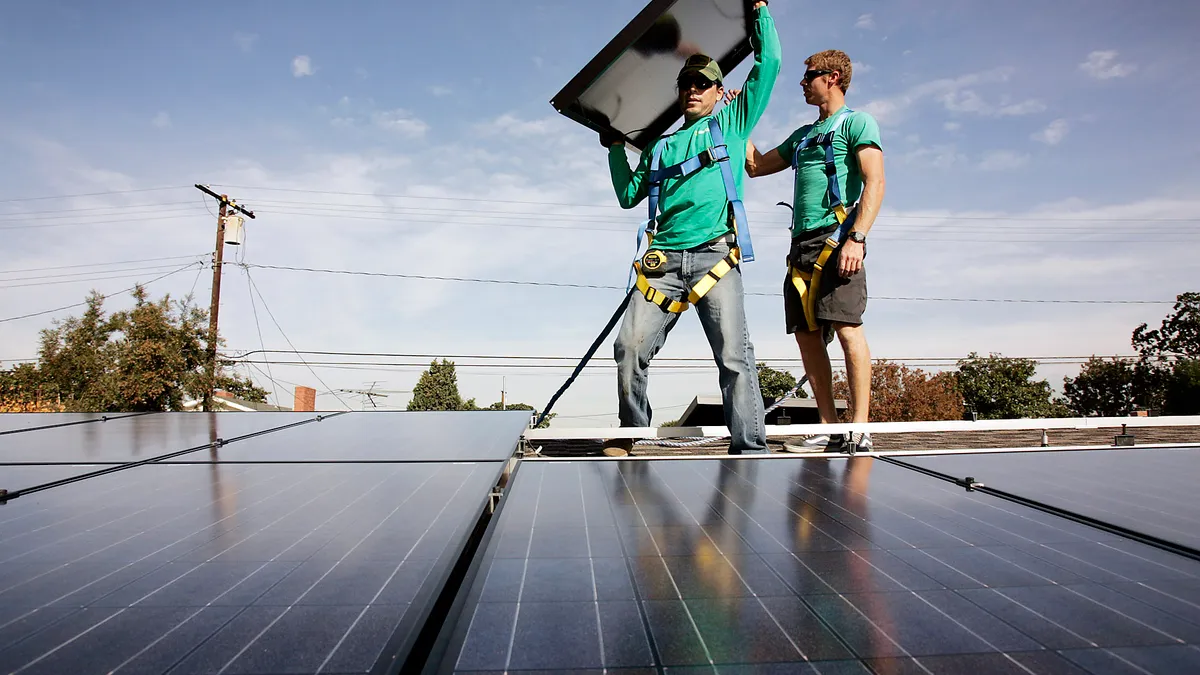Dive Brief:
- The Public Service Commission of the District of Columbia announced on Monday it will issue a notice of inquiry to investigate potential rules for distributed energy resources (DERs), including issues related to the ownership and classification of energy storage and its operation in wholesale markets, behind-the-meter energy storage control, solar PV ownership, and other resources including demand response.
- Regulators on Monday approved the investigation as part of a second set of grid modernization recommendations originating from a June stakeholder report, Modernizing the Energy Delivery System for Increased Sustainability (MEDSIS). The PSC's order also calls on Exelon subsidiary Potomac Electric Power (Pepco) to make system-level data available on its website and enhance data access for all residential customers through the Green Button Connect system.
- The PSC decided consideration of performance-based regulation (PBR) and incentives would be taken up in Pepco's ongoing rate case rather than in a separate proceeding. Customer advocates were critical of the move, saying it could lead to a "piecemeal" approach to grid modernization.
Dive Insight:
Regulators say D.C. must move quickly to reach its 2032 climate and clean energy goals, but advocates are wary of an approach that doesn't consider issues holistically.
"If the District is to meet its targeted energy and climate goals in 12 years, then time is of the essence, and we will have to replace a business as usual approach with a consideration of options that result in an expansion of the regulatory paradigm," the PSC wrote in its decision.
The PSC's first PowerPath DC Order was issued in January, adopting more than a half dozen MEDSIS recommendations and outlining steps the commission and stakeholders will need to take to deliver 50% renewable energy in the next dozen years.
The commission's second order adopts 11 recommendations, including continuing to improve the small generator interconnection process, calling on Pepco to update hosting capacity maps on a monthly basis, and finding a need for non-wires alternatives demonstration projects in the city.
Among potential non-wires demonstrations, the D.C. Department of Energy and Environment has raised the idea of placing solar systems on about 200 rooftops and aggregating the generation with utility- or customer-owned battery storage, to serve critical loads of the homes during an outage and generate revenues from energy, capacity and ancillary markets during normal grid conditions.
On the topic of performance-based regulation, the commission adopted a staff recommendation to move consideration of utility incentives into Pepco's formal multi-year rate case. That approach, however, drew concern from some stakeholders who say a more detailed and formalized planning process for PBR is appropriate.
"In many respects I think the order confirms what the PSC's inclination has been with respect to grid modernization all along — to work it piecemeal through existing formal cases," Larry Martin, the Sierra Club's District of Columbia chapter conservation chair, told Utility Dive.
The commission will consider performance-based issues in three meetings within Pepco's rate case, which Martin said would "probably not flesh out PBR as thoroughly as we've seen other states attempt." He pointed to proceedings in New York, California and Hawaii, where the single issue was discussed for months.
"The provision in the order to discuss multi-year planning in the context of a contested rate case really gives short shrift to the performance-based regulation thinking we believe is required," said Martin.
Martin, who also works with the Grid 2.0 Working Group, said that organization will consider in the next few days whether to appeal the commission's order.
Grid 2.0 on Monday filed comments arguing that the process for identifying performance incentive mechanisms within Pepco's rate proceeding is "insufficient" and "needs to be linked to an integrated planning process."
Pepco, in a statement, said it supported the PSC's order and called it a "significant step forward" for the city's grid modernization efforts. The utility supported consideration of PBR issues within its formal rate proceeding.
Pepco also said efforts to advance solar, increase grid resiliency, and expand public information to help customers make more informed choices regarding their energy service, will result in "cleaner energy opportunities for the District and a more reliable and resilient energy grid for our customers."
The commission directed PSC staff to issue a notice of inquiry (NOI) into DER ownership issues within 60 days, rejecting concerns that the approach would slow the deployment of equipment and projects.
"We do not believe that an NOI proceeding would unreasonably delay deployment of DER," said regulators. "Besides, it is more important to get it right first than to rush into such deployment without further consideration of the issues."















